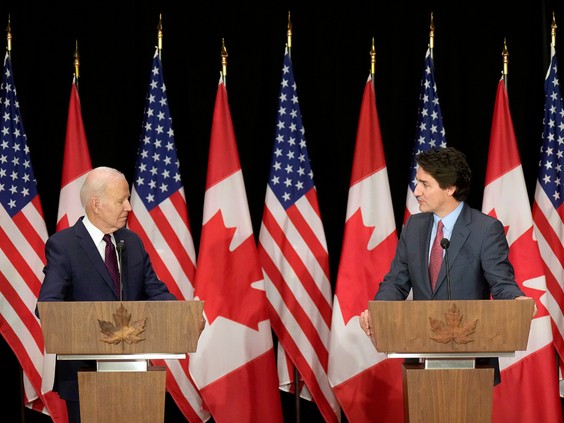
3 Criteria by Which To Gauge China-US Relations
The United States Continues to 'Decouple' and 'De-Risk' from China
In my view, at the economic level, Washington will continue to “decouple” itself from China in the high-tech field while at the same time “de-risking” from China in other industries or sectors. Concretely, in areas such as semiconductors, artificial intelligence and quantum computing, the U.S. will continue to clamp down on China, but in other areas it will maintain its economic and trade ties with China, as Biden’s reelection bid is contingent on his maintaining U.S. economic growth and avoiding a recession.
It bears pointing out that U.S. and Western claims that they are de-risking, not decoupling, are false, as to build a “small courtyard, high wall” against China in the high-tech field is tantamount to decoupling. What requires close monitoring is whether that “small courtyard, high wall" will expand to become a comprehensive decoupling from China. The answer to this question lies not in economics but in politics.
At the political level, U.S. relations with China depend on the following three criteria.
First, will the U.S. allow China’s comprehensive national power to narrow the gap between itself and China?
Ever since the U.S. overtook the United Kingdom to become the world’s number one superpower, it has adopted a strategy of suppression and containment, whether in its dealings with the different social systems and ideologies of the Soviet Union or in its dealings with those of Japan, which are basically the same as its own. There is a quantitative indicator — “Uncle Sam” does not allow any country’s economic aggregate to exceed 60% of its own. That is a criterion that China has shattered, which is why Raimondo lamented that China was the greatest threat the U.S. had ever faced.
Second, will the U.S. accept that China, which has a different social system and ideology than its own, is shifting closer to the world’s center stage?
China has no intention of surpassing or replacing the U.S. The main objectives and tasks for the next five years, as set out at the 20th National Congress of the Chinese Communist Party, are to further enhance China’s international status and influence, to play a greater role in global governance, and in terms of comprehensive national power and international influence, to build our country into a leading, modern socialist power by the middle of this century. Note that it is “a” leading, rather than “the” leading, as a multipolar world system is what President Xi Jinping advocates in jointly constructing a community with a shared future for humankind. The U.S. should accept that other major powers share responsibility for global governance along with it.
Third, will Americans allow the Chinese to develop their economy and enjoy the same prosperity that they do?
In an exclusive interview with the Australian media at the White House on April 15, 2010, then-U.S. President Barack Obama said, “If over a billion Chinese citizens have the same living patterns as Australians and Americans do right now, then all of us are in for a very miserable time, the planet just can’t sustain it, so they understand that they’ve got to make a decision about a new model that is more sustainable that allows them to pursue the economic growth that they’re pursuing while at the same time dealing with these environmental consequences.”
There were two implications to Obama’s statement. The first was his view that China’s leaders would strike a balance between economic development and environmental protection, and there is nothing wrong with that, as one of the hallmarks of Chinese-style modernization is for people to live in harmony with nature. But at the same time, he shifted responsibility for protecting the environment wholly onto the Chinese government and people, neither reflecting on the damage done to the environment by the capitalist system of the U.S. and the West nor expressing any intent to change developed countries’ production methods and lifestyles to protect the planet. This is a mentality of unreconstructed hegemony.
Not Accepting China’s Move toward the World’s Center Stage
There is a view that China should consciously maintain a development gap between itself and the U.S.; that is, that it should take the initiative to keep away from the first criterion — but this view is both naïve and unattainable. Not tailgating someone on a highway is simple enough, but in terms of economic and social development, countries cannot avoid catching up with each other. The main reason for this is the confidentiality adopted by countries in many areas of economic and social development, but another more technical reason is that statistics on economic and social development are compiled retroactively. What is more, U.S. relations with China depend on two other criteria. If China takes the initiative to slow down its economic and social development, the likely result will not be greater tolerance from the U.S. but intensified suppression.
For other Western countries in their dealings with China, the first criterion mentioned above is not important, but the second and third criteria are; if nothing else, the European Union referring to China as its “systemic rival” shows that the entire Western camp finds China’s move to the world’s center stage hard to swallow.
On Nov. 24, 2023, at the Shanghai Forum of the World Conference on Chinese Studies, University of Adelaide Professor Gao Mobo told a story. “Mobo,” one of his friends asked him, “what would life be like if China became as powerful as the United States?” Gao opined that although [Americans] complain about the creature comforts with which they are familiar from their lives today, such as Coca-Cola and Hollywood, these are what they are accustomed to. But how would they feel if China became so powerful that it could influence the world? They would be worried.
As the three criteria mentioned here converge, U.S. relations with China look unpredictable.

